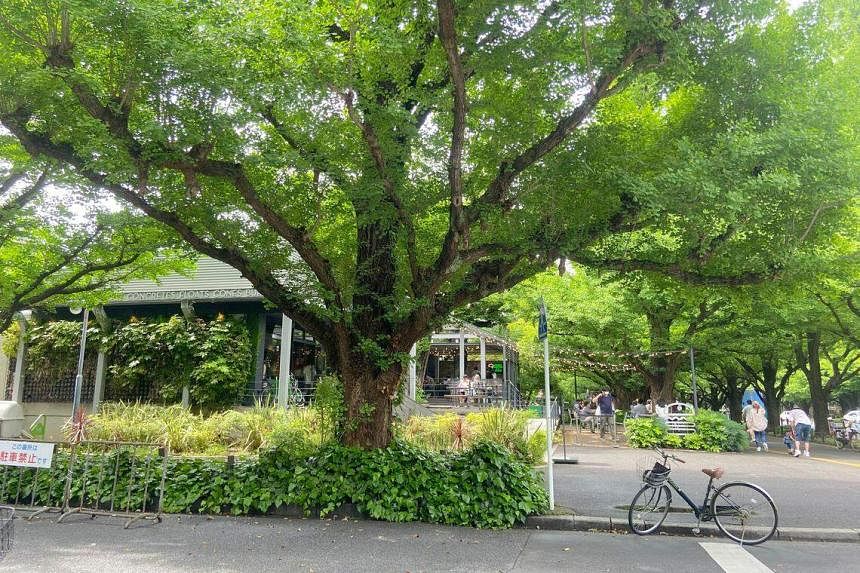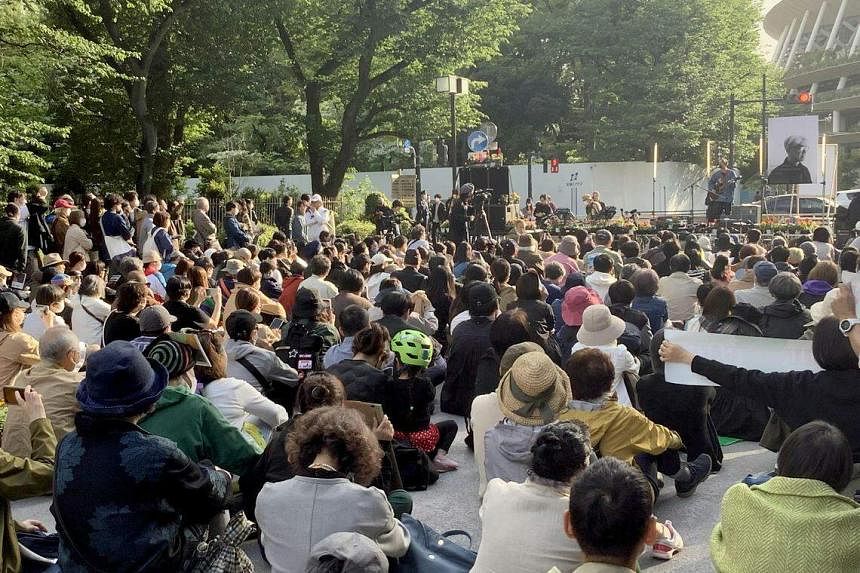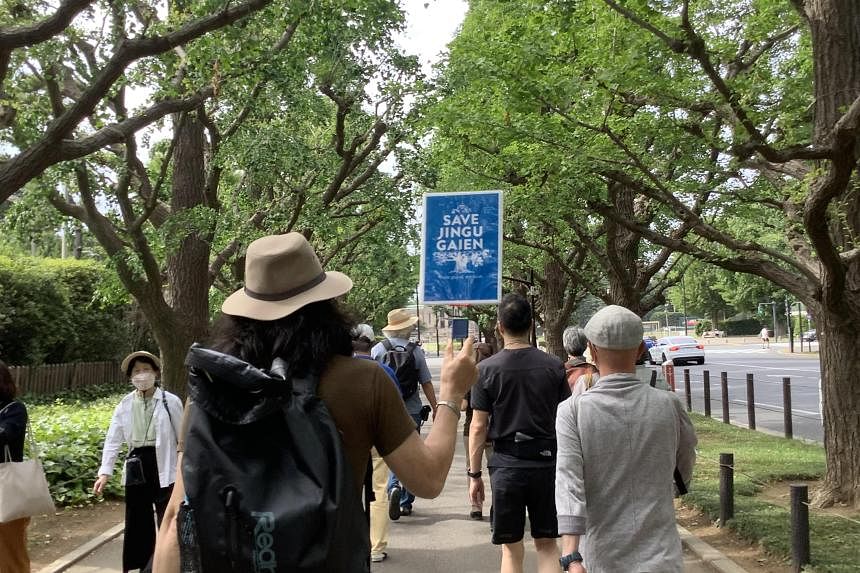TOKYO – A plan to redevelop a well-loved leafy oasis in the heart of Tokyo has drawn protests from residents and celebrities such as novelist Haruki Murakami since it was first announced in 2022.
Now, the planned redevelopment has raised alarm even outside Japan.
The International Council on Monuments and Sites (Icomos) has opposed the plan approved by Tokyo Governor Yuriko Koike as it would lead to the massive upheaval of Meiji Jingu Gaien (outer precinct). The Meiji Jingu Naien (inner precinct), where the city’s well-known Meiji Jingu Shrine is located, will not be touched by the planned development.
The project is led by developer Mitsui Fudosan, the Japan Sports Council, trading house Itochu and Meiji Jingu Shrine, which owns the land.
Under the plan, two skyscrapers about 200m tall will be built on parkland that previously had a height limit of 15m. An existing baseball stadium, home to the Tokyo Yakult Swallows and where the late American legend Babe Ruth once played, and the adjacent rugby venue will also be torn down and rebuilt.
Shinjuku ward, which covers part of the site, has given the green light recently for 3,000 trees, hedges and shrubs to be chopped down from September. While its famous ginkgo trees, which turn a spectacular gold in autumn, will be spared the axe, environmentalists say heavy construction work will inevitably affect the trees.
Questions are being asked about whether private developers and politicians can decide how public park space is used without consulting the public.
Those who are opposed to the plan say it is tantamount to building skyscrapers in the middle of New York’s iconic Central Park. They note that Jingu Gaien is rich in heritage, having been built with donations in honour of Emperor Meiji, who ruled from 1867 to 1912.
Residents near the parkland have filed at least two class-action lawsuits against the plan, arguing that they were not properly consulted. Activists bemoan the loss of green space and biodiversity, while an online petition has drawn more than 220,000 signatures since it was started in February 2022.
Icomos, a Unesco World Heritage advisory body, issued a worldwide Heritage Alert earlier in September, calling for the redevelopment plan to be axed. Such alerts are not legally binding, but are meant to draw attention to cultural properties that are in danger.
Jingu Gaien is part of a garden city park system that has its roots in the 17th-century Edo period, Icomos Japan director Mikiko Ishikawa said at a news conference on Thursday.
She added that the redevelopment would cause the “complete destruction of an urban forest that has been formed and nurtured over the past 100 years”.
“If we allow this to happen, it would be like a dam bursting,” she said.

Parks slated for redevelopment in Tokyo include Shiba, Hibiya and Kasai Rinkai parks; the large-scale felling of trees is also being planned in areas like Hokkaido, Yokohama and Osaka.
In an open letter to stakeholders, including Prime Minister Fumio Kishida, Icomos said Jingu Gaien was created as a “forest for the people”, with the Jingu Naien (inner precinct) an “eternal forest”.
It described Jingu Gaien as an “outstanding example of a citizen-owned park, unparalleled in the history of urban parks worldwide”.
“Icomos regards this as an irreversible destruction of cultural heritage and an unacceptable loss of open space and mature heritage trees at a time when the world response to climate change recognises the critical importance of maintaining urban open spaces and all parts of the urban forest,” the letter said.

Among the trees to be axed at Meiji Jingu Gaien are 500 that are at least 100 years old, and another 500 that are over 50 years old.
Many prominent Japanese celebrities have protested against the redevelopment plan.
Murakami had said that he was inspired to become a writer after watching a game at the parkland’s baseball stadium, where the “satisfying crack of the bat meeting the ball” led him to pick up a pen and write his 1979 debut Hear The Wind Sing.
The late maestro Ryuichi Sakamoto was adamant about protecting the parkland. In an open letter to Ms Koike just before he died in March 2023, he wrote: “We should not sacrifice the precious trees of Jingu that our ancestors spent 100 years protecting and nurturing, just for quick economic gain.”
Popular Japanese rock band Southern All Stars released a new single in September titled Relay, Song Of The Forests, which is in memory of Sakamoto and in protest against the Jingu Gaien plan. The song asks: “Is a lovely oasis turning into an asphalt jungle?” and “Are we allowed to block the sky with a future city?”
Lead singer Keisuke Kuwata, who records music at a studio near the park, told a radio programme: “I have a great attachment to this area; it’s like my home town.”
Resident Hajime Funada, a lawmaker with the ruling Liberal Democratic Party, leads a bipartisan 26-member group of parliamentarians against the site’s development. He said: “I and my dog are worried about what will happen to the nature in Jingu Gaien.”
He called the redevelopment “excessive” for the number of trees to be felled, and pointed to the Hanshin Koshien Stadium in Kobe as an example of redevelopment that avoided tearing down a historic site.
Meiji Jingu Shrine has stated that it is under financial duress – despite opening a new museum in 2019 that was designed by acclaimed architect Kengo Kuma – and wants to commercialise the fringe area to safeguard the sacrosanct inner precinct where the main place of worship is. The shrine has, however, not disclosed any financial statements.
Icomos has questioned the environment feasibility studies carried out by the developers. It noted that a 40m-deep piling for the new stadium will be embedded just 6m from the tree trunks, which will inevitably affect the quality and water content of the soil.
The new stadium, which will include a hotel, will also block sunlight for the trees, the council said.
Although the courts have rejected temporary injunctions against the redevelopment, there has been an unlikely stay of execution from Ms Koike. While she has long insisted that the project must go ahead, intensifying scrutiny has led her to urge the developers to relook their assessments, saying she wanted “more concrete conservation measures”.
Management consultant Rochelle Kopp, a long-time resident of Japan who is the lead plaintiff in one of the lawsuits, told The Straits Times that she was aghast at how the law does not protect the right of Japanese citizens to green space and a clean environment.
She felt that construction companies in Japan hold excessive influence, leading to an unhealthy addiction to unnecessary redevelopment in the country.
She said the stakes are high: “Given all the other projects around Japan, we want to make this a successful precedent.”
Editor’s note: A previous version of the story, which described the Meiji Jingu Gaien as a park next to the Meiji Jingu Shrine, has been revised for clarity.


